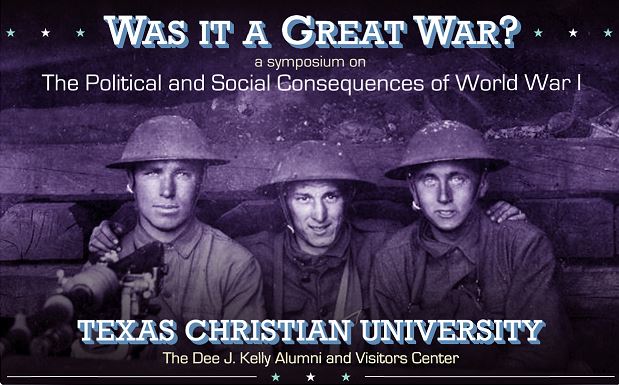To add or suggest an event, please contact our event coordinator here

- This event has passed.
Was it a Great War? A Symposium on the Social and Political Consequences of World War I
March 3, 2017 @ 6:30 pm - March 4, 2017 @ 12:00 pm
FreeEvent Navigation

Was it a Great War? A Symposium on the Social and Political Consequences of World War I
April 2017 will mark the one hundredth anniversary of the United States’ entry into what was then known as the Great War. In commemoration, the Benjamin W. Schmidt Professorship in War, Conflict, and Society, along with the Department of History, will present a public symposium that invites the TCU and Fort Worth communities to reflect on the war’s meaning and significance.
Many Americans know little about the First World War. American participation was comparatively brief, and the war failed to capture the cultural imagination in ways that later wars did. As historians maintain, however, in many ways the war inaugurated the twentieth century. The world’s first technological war, it introduced modern weaponry that forever changed the face of war and that inflicted unprecedented physical and mental wounds that haunted a generation. Despite the iconic image of the trench as the symbol of the war on the Western Front, the war required the movement of millions of people, for whom the war proved a transformative experience. Among those millions were women, African Americans, and colonial subjects who served their countries even as their countries failed to recognize them as full citizens. The one hundredth anniversary of the U.S. entry into the war marks an opportune moment to consider the war’s political and social consequences.
This symposium will bring together nine accomplished scholars whose work considers the ways the war changed the political, social, and cultural landscapes of the United States, Europe, and the world. The symposium will allow the scholars to engage in conversation with each other, students, and the public about whether, in fact, it was a “Great War.” The first session will answer that question by examining the political meanings of the war. The second session will continue the examination by shifting our focus to a consideration of whether the war as “Great” for societies, peoples, and cultures. Because of its broad focus, the symposium will be of tremendous interest to students taking courses in fields such as history, English, political science, international relations, and military science. It will also appeal widely to the public, whose interest in the war is likely to be piqued on this important anniversary.
Speakers
Richard S. Fogarty is Associate Professor of History and Associate Dean for General Education at the University at Albany, SUNY. A historian of modern France and Europe, with particular interests in the histories of culture, politics, war, and the military, he has written extensively on World War I, the French army, racism, and French and European attitudes toward Islam and Muslims. He is the author of Race and War in France: Colonial Subjects in the French Army, 1914-1918 and co-editor of Empires in World War I: Shifting Frontiers and Imperial Dynamics in a Global Conflict. He is now working on a study of North African Muslims as prisoners of war in Germany, with special attention to the place of Islam in the wider military and ideological struggle in Europe and the Middle East.
Susan R. Grayzel is Professor of History and Director of the Sarah Isom Center for Women and Gender Studies at the University of Mississippi. She has authored several books on the consequences of World War I for women and civilians in Europe, including Women’s Identities at War: Gender, Motherhood, and Politics in Britain and France during the First World War, which won the British Council Prize from the North American Conference on British Studies, Women and the First World War, At Home and Under Fire: Air Raids and Culture in Britain from the Great War to the Blitz and The First World War: A Brief History with Documents. She is currently editing (with Tammy Proctor) a collection of essays on the ways World War I shaped gender across the world.
Andrew Huebner is Associate Professor of History at the University of Alabama. A scholar of twentieth-century U.S. politics, society, and culture, he has written about the relationship between the media and war, as well as images of American soldiers in popular culture. He is the author of The Warrior Image: Soldiers in American Culture from the Second World War to the Vietnam Era. He is currently working on a book on American families and public culture during the First World War, tentatively titled “Love and Death in the Great War.”
Jennifer Keene is Professor of History and Chair of the History Department at Chapman University. She also serves as Vice President of the Society for Military History, serves on the advisory board of the International Society for First World War Studies, and is a member of the Historical Advisory Board for the U.S. World War One Centennial Commission. A specialist in the American military experience of World War I, she has published several books on the war, including World War I: The American Soldier Experience (2011), World War I: American Soldiers’ Lives (2006), Doughboys, the Great War and the Remaking of America (2001), and The United States and the First World War (2000).
Michelle Moyd is Associate Professor of History at Indiana University and a scholar of eastern Africa, World War I, colonialism, soldiers, and militarization. She is the author of Violent Intermediaries: African Soldiers, Conquest, and Everyday Colonialism in German East Africa and is currently completing another book the war entitled “Africa, Africans, and the First World War.” She has published several articles on African soldiers who served in colonial European armies during World War I. She has held prestigious fellowships at Humboldt University in Berlin and the University of Texas-Austin, and has been a Fulbright Scholar in Tanzania.
Michael Neiberg is the Henry L. Stimson Chair and Professor of History in the Department of National Security and Strategy at the US Army War College. A noted expert on the World Wars, he has published several books on the war, including Dance of the Furies: Europe and the Outbreak of World War I, which was named by the Wall Street Journal as one of the five best books ever written on the First World War. His history of American responses to the First World War will be published by Basic Books. Additionally, he has authored two works on World War II: The Blood of Free Men, a history of the liberation of Paris in 1944 and Potsdam: The End of World War II and the Remaking of Europe.
Stephen Ortiz is Associate Professor of History at Binghamton University, SUNY. A political, military, diplomatic, and gender historian of the twentieth-century United States, his publications have examined the ways veterans have shaped American society and politics. He is the author of Beyond the Bonus March and GI Bill: How Veteran Politics Shaped the New Deal Era and editor of Veterans’ Policies, Veterans’ Politics: New Perspectives on Veterans in the Modern United States, along with several articles that have appeared in academic journals. He is completing a new book tentatively titled “Comrades in Arms: Veteran Organizations and the Politics of National Security in the American Century.”
Tammy Proctor is Professor of History and Department Head in History at Utah State University. Her past research has examined the social and cultural history of World War I. Her publications include Civilians in a World at War, 1914-1918, Female Intelligence: Women and Espionage in the First World War, and two books on the history of scouting in Britain. She is currently completing two projects on World War I: “A Short History of World War I” and a collection of essays (co-edited with Susan R. Grayzel) on the ways World War I shaped gender across the world.
Keynote Speaker
Adam Hochschild is a prolific and accomplished writer whose most well-known works include To End All Wars: A Story of Loyalty and Rebellion, 1914-1918 (2011), Bury the Chains: Prophets and Rebels in the Fight to Free an Empire’s Slaves (2005), and King Leopold’s Ghost: A Story of Greed, Terror, and Heroism in Colonial Africa (1998). A lecturer in journalism at the University of California Berkeley, he is a fellow of the American Academy of Arts and Sciences, the recipient of the American Historical Association’s Theodore Roosevelt-Woodrow Wilson Prize, a two-time finalist for the National Book Critics Circle Award, and a finalist for the National Book Award.


